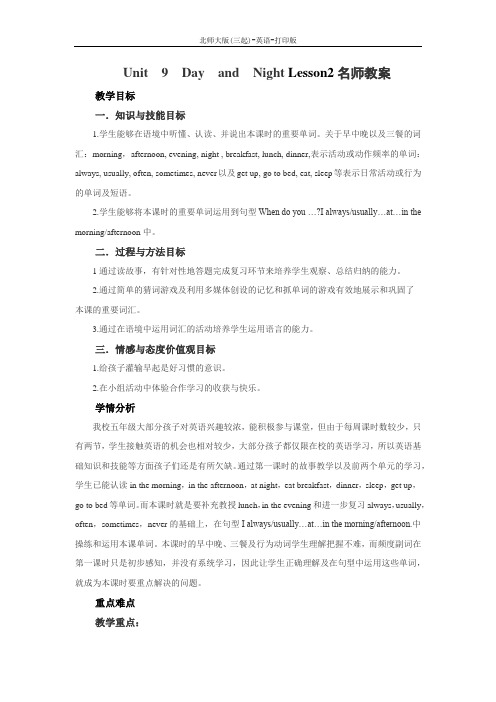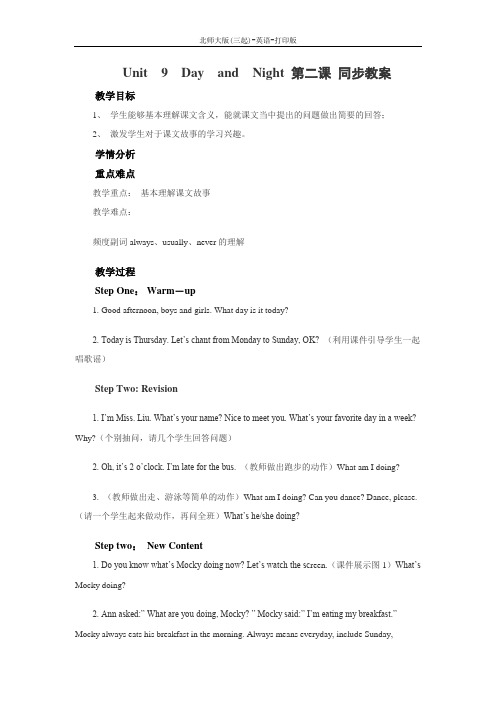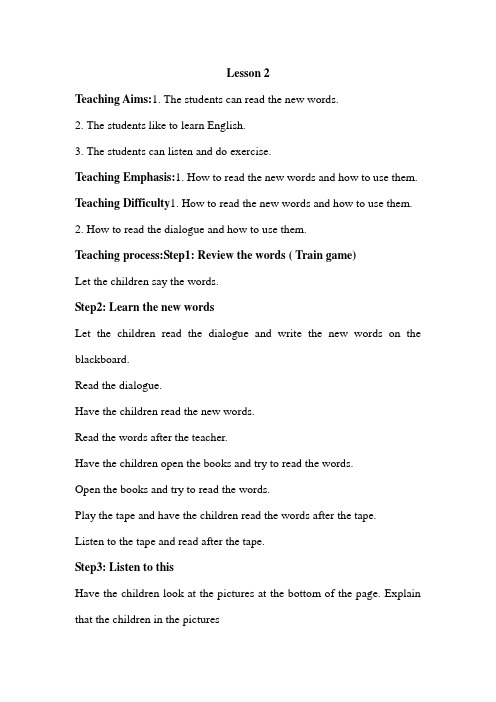五年级英语下册Unit9DayandNightLesson2EnjoytheStory同步练习北师大版(三起)
小学英语教案北师大版五年级下册英语Unit9Dayandnight教案

Unit 9 Day and night单元教材分析本单元是北师大版小学英语四年级下学期的第九单元,是在七、八单元学习了星期和钟点的表达法的基础之上的进一步延续。
主要涉及的知识点是一天中morning,afternoon,evening,night的表达法和breakfast, lunch, dinner,频度副词always,usually,often,sometimes,never以及日常生活中一些行为动词及短语get up, go to bed, eat,sleep等。
根据词不离句的教学理念,我将本课单词的教学放在 When do you…? I always/ usually…at…in the morning/ afternoon.的句型中进行巩固和运用。
单元教学目标教学目标:1、知识目标:(1)能听懂、会说以下单词:breakfast, lunch, dinner, morning, afternoon,sleep , when,等表示日常活动或行为的单词,及认读always, usually, often, sometimes, never等频度的单词,能在交流中运用。
(2)能听懂、运用以下日常交际用语:句型When do you…? I always/usually…at…in the…. 。
2、能力目标:能用所学的知识简单的表述自己想询问别人时间的安排。
能运用句型When do you…? I always/usually…at…in the…. 。
3、情感目标:(1)增强学生运用所学英语进行交际的意识和勇气。
(2)通过鼓励学生在真实的语言情景中学会养成生活有规律的意识和习惯。
教学重点1.本课表示三餐的词语breakfast, lunch, dinner,动词及短语get up, go to bed, eat, sleep,频率副词always,usually,often,sometimes,never2.句型When do you…? I always/usually…at…in the…. 。
最新五年级英语下册Unit9《Dayandnight》 2北师大版(三起)优选教学课件

Unit 9
Day
and
night
nightAt night:在夜间
[naɪt]
夜间
afternoon In the afternoon:在下午 Good afternoon:下午好
北师大版-英语-五年级下册-Unit 9 Day and Night Lesson2名师教案

Unit9Day and Night Lesson2名师教案教学目标一.知识与技能目标1.学生能够在语境中听懂、认读、并说出本课时的重要单词。
关于早中晚以及三餐的词汇:morning,afternoon, evening, night , breakfast, lunch, dinner,表示活动或动作频率的单词:always, usually, often, sometimes, never以及get up, go to bed, eat, sleep等表示日常活动或行为的单词及短语。
2.学生能够将本课时的重要单词运用到句型When do you …?I always/usually…at…in the morning/afternoon中。
二.过程与方法目标1通过读故事,有针对性地答题完成复习环节来培养学生观察、总结归纳的能力。
2.通过简单的猜词游戏及利用多媒体创设的记忆和抓单词的游戏有效地展示和巩固了本课的重要词汇。
3.通过在语境中运用词汇的活动培养学生运用语言的能力。
三.情感与态度价值观目标1.给孩子灌输早起是好习惯的意识。
2.在小组活动中体验合作学习的收获与快乐。
学情分析我校五年级大部分孩子对英语兴趣较浓,能积极参与课堂,但由于每周课时数较少,只有两节,学生接触英语的机会也相对较少,大部分孩子都仅限在校的英语学习,所以英语基础知识和技能等方面孩子们还是有所欠缺。
通过第一课时的故事教学以及前两个单元的学习,学生已能认读in the morning,in the afternoon,at night,eat breakfast,dinner,sleep,get up,go to bed等单词。
而本课时就是要补充教授lunch,in the evening和进一步复习always,usually,often,sometimes,never的基础上,在句型I always/usually…at…in the morning/afternoon.中操练和运用本课单词。
北师大版-英语-五年级下册-Unit 9 Day and Night第二课 同步教案

Unit9Day and Night 第二课同步教案教学目标1、学生能够基本理解课文含义,能就课文当中提出的问题做出简要的回答;2、激发学生对于课文故事的学习兴趣。
学情分析重点难点教学重点:基本理解课文故事教学难点:频度副词always、usually、never的理解教学过程Step One: Warm-up1. Good afternoon, boys and girls. What day is it today?2. Today is Thursday. Let’s chant from Monday to Sunday, OK? (利用课件引导学生一起唱歌谣)Step Two: Revision1. I’m Miss. Liu. What’s your name? Nice to meet you. What’s your favorite day in a week? Why?(个别抽问,请几个学生回答问题)2. Oh, it’s 2 o’clock. I’m late for the bus. (教师做出跑步的动作)What am I doing?3. (教师做出走、游泳等简单的动作)What am I doing? Can you dance? Dance, please. (请一个学生起来做动作,再问全班)What’s he/she doing?Step two:New Content1. Do you know what’s Mocky doing now? Let’s watch the sc reen.(课件展示图1)What’s Mocky doing?2. Ann asked:” What are you doing, Mocky? ” Mocky said:” I’m eating my breakfast.” Mocky always eats his breakfast in the morning. Always means everyday, include Sunday,Monday, Tuesday, Wednesday, Thursday, Friday, Saturday and all the holidays. Read after me, always, use your fingers, a-l-w-a-y-s, always. Read after me, I always eat breakfast in the morning.3. (课件展示图2)Now, Mocky wants to know what time does Ann eat her breakfast. So he asked:” When do you eat breakfast, Ann?” Ann answered:”breakfast in the morning, too.” When equals to what time. (板书提示)4. When do you eat breakfast? OK, please ask your partner when does he or she eat breakfast? Practice in pairs. (引导学生两人小组进行对话练习)Who want to have a try? Hands up. (请几个学生回答问题)5. Do you always eat breakfast in the morning? On Saturdays, I don’t eat breakfast in the morning. I sleep in the morning on holidays. So I could only say: I usually eat breakfast in the morning. Usually means not always.6. (课件展示图6)Ann and Mocky go to visit Uncle Booky. Ann wanted to know what does Uncle Booky do in the morning. Do you want to know? How does Mocky answer her? Watch the screen. Let’s read the sentence together. He usually reads a book. What do you do in the morning?(询问几个学生)Now you can ask your partner what does he or she do in the morning or afternoon, practice in pairs.(引导学生进行两人练习,并请两组学生起来展示对话)7. Ken, Ann and Mocky go to visit Uncle Booky. Now, they are at Uncle Booky’s house. But where is Uncle Booky?8. (课件展示图9)Do they find Uncle Booky? Where is he? Does Mocky know? No, he doesn’t know. He says:” I don’t know. He’s usually at home in the morning.”9. (课件展示图10)Uncle Booky is usually at home in the morning, when does he go to the store? Ken wants to know, so he asks. Mocky answered:” He o ften goes to the store in the afternoon. He never goes in the morning.” Often and usually are almost the same meaning.(手势讲解差不多相同)Never means no, not.(加上表情、手势强调never,贴片讲解)Let’s read the two sentences together. He often goes to the store in the afternoon. He never goes in the morning.10. Where is Uncle Booky? What’s he doing now? Can you guess?(请两三个学生起来猜Uncle Booky到底在做什么)Look, he’s sleeping. He sometimes sleeps in the morning! Uncle Booky usually reads a book in the morning, but that day, he sleeps. So he sometimes sleeps in the morning.Step three: Practice1. Do you like the story? I like it because it’s funny. Let’s watch it from the very beginning. After you watch the whole story, please answer my questions.(课件从头播放故事动画)2. Here are the questions for you.(课件展示提问的几个问题)You can talk with your partner, and then give me your answer.(引导学生小组之内根据课文内容讨论问题,然后进行问题的回答)3. After class, please read the story after the tape. Next time, please tell the story to us, OK? That’s all for today. Goodbye, boys and girls!。
小学五下北师大英语Unit 9 Day and night Lesson 2 Lets Practice 教案备课

Lesson 2Teaching Aims:1. The students can read the new words.2. The students like to learn English.3. The students can listen and do exercise.Teaching Emphasis:1. How to read the new words and how to use them. Teaching Difficulty1. How to read the new words and how to use them.2. How to read the dialogue and how to use them.Teaching process:Step1: Review the words ( Train game)Let the children say the words.Step2: Learn the new wordsLet the children read the dialogue and write the new words on the blackboard.Read the dialogue.Have the children read the new words.Read the words after the teacher.Have the children open the books and try to read the words.Open the books and try to read the words.Play the tape and have the children read the words after the tape.Listen to the tape and read after the tape.Step3: Listen to thisHave the children look at the pictures at the bottom of the page. Explain that the children in the picturesPlay the tape and have the children choose the correct answer. Listen to the tape and choose.Play the tape again and have the children check the answer. Listen to the tape again and check.Step4: Talk togetherHave the children look at the pictures and talk about the dialogue. Look at the pictures and try to talk about.Have the children read the dialogue by themselves.Try to read the dialogue.Have the children read the dialogue after the teacher.Read the dialogue after the teacher.Have the children read the dialogue in pairs.Read it in pairs.Have the children read the dialogue one group by one group. Read the dialogue.Step5: Listen and practiceHave the children look at the pictures and try to read the sentences. Try to read the sentences.Play the tape and have the children read it after the tape.Listen and repeat.Have the children read the sentences together.Read the sentences together.Homework: Copy the new words four times.。
五年级下册英语-Unit 9 Day and Night Lesson 1 北师大版

lunch 午餐
never 从不,从未
Where is it?
Beijing
Vancouver
New York
London
What time in the 2.要在读熟的基础上背诵,未读熟之前不要急于背诵。
in the
读这一则新闻,可以感知,中国人民解放战争转入战略进攻阶段以后,我军完全掌握了全国战场的主动权,经过一年多英勇奋战,蒋
morning 介石全军崩溃之势已成,败局已无可挽回。
四年级语文下册《夜莺的歌声》课文原文
afternoon
3、多向交流,听的人提出问题,介绍者回答补充。教师相机评价,关注语言的流畅性条理性,即评即改,真正提高学生的口语表达能
力。
New York
London
in the evening
at night
morning 早上
in the morning. 在上午
space 太空
ask 问,询问 him 他
question 问题
when 什么时候
get up 起床
always 总是
often 经常
breakfast 早餐
sometimes 有 时
meat 肉
newspaper 报 纸
exercise 运动,锻炼
3.怎样写应试作文 “水滴石穿──非一日之功”“早开的红梅──一枝独秀”“砌墙的石头──后来居上”比较容易理解。后三句“关羽失荆州──骄兵必败”、“王羲之 写字──入木三分”、“周瑜打黄盖──一个愿打,一个愿挨”都包含着典故,需要老师或有这方面知识的学生简要地讲一讲。 奶奶给我讲过这样一件事:有一次她去商店,走在她前面的一位阿姨推开沉重的大门,一直等到她跟上来才松开手。当奶奶向她道谢 的时候,那位阿姨轻轻地说:“我的妈妈和您的年龄差不多,我希望她遇到这种时候,也有人为她开门。”听了这件事,我的心温暖了许 久。
闽教版-英语-五年级下册-【精品】Unit 9 Day and Night Lesson 2 教案
Unit 9 Day and NightLesson 2教案一、教材分析:频度副词是学生首次接触的内容,这些词可以在讲故事的过程中通过教师语言的描述和教师自制的卡片进行讲解,帮助学生理解词汇的意义。
二、教学目标:1. 通过整体视听故事,引导学生理解故事大意;2. 通过教师语言描述和图示使学生初步理解频度副词的含义;3. 通过回答教师问题和观察图片信息,引导学生关注故事中的细节问题;4. 对理解故事情节、语言内容的方法和策略进行指导;5. 部分学生能在小组内分角色朗读课文。
三、教学难点:学生对频度副词的理解。
四、教学用具:PPT自制课件、flash课件。
五、课前准备:本课单词卡片和图卡、一套多媒体课件、录音机、课本。
六、教学步骤:Step 1 Free talk 导入新课T: Hello, My children! Let's begin our class, OK? Ss: OK.T: What day is it today? S: Today is … (根据实际情况回答)T:What do you usually do on (根据实际情况)…?S: I go to school /go to English corner /…T: What do you do on Sunday? Ss: I go to the park/ …T: In the morning? in the afternoon? in the evening?教师边提问边出示画有早、中、晚的图片,帮助学生理解morning, afternoon, evening的意思。
(注:学生对于morning, afternoon, evening这三个词并不陌生,教师稍加提醒即可唤起学生记忆。
)T: 教师指着刚刚回答问题的学生问What does he/she usually do on Sunday?Ss: He/She goes to the … (学生说动词第三人称单数的变化时有可能会出现错误,教师可适当予以纠正。
北师大版(三起)五年级英语下册教案Unit 9 Day and Night Lesson 2 Let's Practice教案2
Unit 9 Day and Night Lesson 2 Let's Practice教学设计教学目标1.能够用英语简单描述自己一天的活动。
2.对学生进行养成安排良好作息时间的教育。
3.培养学生听、说、读的能力。
教学重点1.能够用英语简单描述自己一天的活动。
2.对学生进行养成安排良好作息时间的教育。
3.培养学生听、说、读的能力。
教学难点1.能够用英语简单描述自己一天的活动。
2.对学生进行养成安排良好作息时间的教育。
3.培养学生听、说、读的能力。
教具准备教学挂图,教学卡片,录音等。
教学过程1.复习(1)复习本单元的教学卡片。
拿出morning的卡片,引导学生说出正确的单词。
(2)用同样的方法完成单词afternoon, night, breakfast, lunch和dinner.2.学习单词学生用书第34页。
(1)让学生看第34页上半部分的内容。
放录音,让学生指对应的单词或插图。
(2)再放一遍录音,每次放一个词组或单词。
让学生跟读。
(3)完整地放一遍录音,让学生跟读。
(4)不放录音,指着插图或者单词让学生说出英文。
(5)用同样的方法完成其他的插图和单词。
3.听一听,连一连学生用书第34页。
(1)让学生翻开书第34页,把这一页给学生展示。
指着第一幅插图让学生描述图中有哪些人,他们在干什么。
(2)用同样的方法完成其他插图。
(3)告诉学生接下来听录音,根据录音把插图和对应的句子连起来。
(4)放第一句话的录音,让学生指出对应的插图以及对应的句子。
(5)用同样的方法完成其他句子。
(6)再放一遍录音,每次放一句。
告诉学生把插图和对应的句子连起来。
(7)全班一起核对答案。
4.唱一唱学生用书第35页。
(1)告诉学生接下来将要学习一首歌曲,让学生翻开书第35页。
(2)让学生看页面上的插图,说一说插图的内容。
鼓励学生先读一读歌词。
(3)放歌曲的录音,让学生认真听。
(4)再放一部分的录音,每次一句,让学生重复。
五年级下册英语Unit9 Day and night 北师大版
HOMEWORK:
❖ 1.Rember the new words. ❖ 2.Recite the dialog .
√√√ √√
Sometimes I eat meat and fruit!
Sometimes I eat meat and fruit! Sometimes I eat chicken.
I eat meat and fruit.
Mon Tues Wed Thur Fri Sat Sun
√√ √
Pair work: Talk about with your friends.
When do you bed at ten.
I Iooftfetennggoototobbeeddaat ttetenn. . I often go to bed at 10:15 .
I go to bed at ten.
Mon Tues Wed Thur Fri Sat Sun
Day and night
NEW WORDS:
morning
afternoon
evening
night dinner usually
sometimes
breakfast get up often
lunch go to bed always never
What time is it ? Who is he ?
A: When do you get up ? B: I usually get up at 6:00. … A: When do you go to bed? B: I often go to bed at 9:00.
The important sentences:
❖ When do you go to school? ❖ I usually go to school … ❖ When do you get up? ❖ I often get up… ❖ When do you go home? ❖ I sometimes go home…
小学五下北师大英语Unit 9 Day and night Lesson 1 Enjoy the Story 教案
Unit 9 Lesson 1 Enjoy the Story 教案教学目的1通过故事学习能够重点理解本单元的主要结构和表示频度的词汇。
2鼓励学生展开想象大胆实践观察预测故事内容。
3培养学生的听、读的能力。
教学重点1通过故事学习能够重点理解本单元的主要结构和表示频度的词汇。
2鼓励学生展开想象大胆实践观察预测故事内容。
3培养学生的听、读的能力。
教学难点1通过故事学习能够重点理解本单元的主要结构和表示频度的词汇。
2鼓励学生展开想象大胆实践观察预测故事内容。
3培养学生的听、读的能力。
教学方法听、读、说、演等。
教具准备每位学生的名字卡片、教学挂图、教学卡片、录音等。
授课类型学习领会课。
教学过程一、复习1用下面的游戏复习句型"What are you doing?", "I'm (shopping)? ""(He)is(swimming)."(学生要做动作)以及以前学过的表示动作的核心词汇(playing, reading, cooking , sleeping, washing, 和painting)。
2把全班分成两队。
叫一名学生到前面来,悄悄告诉这名学生一个动词。
这名学生所在的小组应该一起提问:"What are you doing?"这名学生回答"I'm··"然后做相应的动作。
3如果这个小组能够猜出动词就获得一分。
例如,如果该学生做的动作是正在睡觉,所在的小组就应该说:"(She)is sleeping."4用同样的方法让另一小组做。
5游戏持续进行,使多数学生有机会表演。
得分最多的队获胜。
二、情景引入1用汉语提问学生早晨醒来之后他们首先做什么。
提问:"你(起床)吗?"2呈现单词always。
把单词写在黑板上并解释意思。
指着单词示范发音, 让学生跟读。
- 1、下载文档前请自行甄别文档内容的完整性,平台不提供额外的编辑、内容补充、找答案等附加服务。
- 2、"仅部分预览"的文档,不可在线预览部分如存在完整性等问题,可反馈申请退款(可完整预览的文档不适用该条件!)。
- 3、如文档侵犯您的权益,请联系客服反馈,我们会尽快为您处理(人工客服工作时间:9:00-18:30)。
Unit 9 Day and Night Lesson 2 Enjoy the Story
同步练习
一、选择正确答案补全句子。
2. They help Uncle Booky _______.
3. Sometimes he _______ in the evening.
4. They _______ at seven.
5. We _______ every day.
二、为下列各图选择相应的对话。
()()()()()1.---What do you often do on Monday morning?
---I often go to school.
2.---Whose cat is it?
---It’s my cat. It always sleeps in the morning.
3.---When do you go to bed?
---I often go to bed at ten o’clock.
4.---What are they doing?
---They’re reading English books.
5.---What is she doing?
---She is painting.
三、单项选择。
( )1.---What time does Mary usually go to bed?
---Mary usually goes to bed at _______.
A. eight thirty
B. thirty eight
C. eight and thirty
( )2.---What are they doing?
A. clean his house
B. takes a walk
C. have dinner
D. exercise
E. get up
---They are _______ a book.
A. reads
B. read
C. reading
( )3.--- _______ do you watch a film?
---We watch a film on Sunday.
A. When
B. What
C. How
( )4.---When does he always watch TV?
---He always watches TV _______.
A. at school
B. after school
C. in school
( )5.---When does he often have breakfast.
---He often _______ at 7:30.
A. having breakfast
B. has breakfast
C. have breakfast
四、根据句意,选择适当的单词填空。
1. Nancy’s mother often _______(helping/helps) her with her math after supper.
2. Sometimes they _______(don’t have/don’t has) lunch at home.
3. She goes to bed _______(at/on) ten o’clock.
4. Berry often _______(washes/washing) her dress on Sunday.
5. Mocky is _______(walks/walking) in space.
五、阅读短文,判断对(√)错(×)。
My name is Bob and I live with my parents in Shanghai, China now. I study in a primary school for foreign children. My parents teach English in a middle school. We are very busy from Monday to Friday.
We live in a new house with three rooms. It is near my parents’ school, but it is far away from my school. I often go to school by school bus.
Today is Sunday. We are all at home today. My father is sitting on a chair near the window. He is reading a book. My mother is in the kitchen. She is cooking for us. I am in my room. I am doing my homework.
( )1.There are five people in Bob’s family.
( )2.His parents teach English in a middle school.
( )3.Their house is near Bob’s school.
( )4.His mother is in the kitchen.
( )5.Bob often goes to school by car.
参考答案
一、1.E 2.A 3.B 4.C 5.D
二、4 3 2 5 1
三、1.A 2.C 3.A 4.B 5.B
四、1. helps 2. don’t have 3. at 4. washes 5. Walking
五、1.× 2.√ 3.× 4.√ 5.×。
